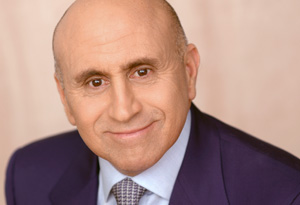Warning Signs of Narcissism and Appearance Obsession

Photo: Stockbyte/Thinkstock
A wrinkle here, a sag there—for some women, it's just the aging process. For others, a less-than-perfect face or figure can bring on anxiety, depression and obsession. In The Beauty Quotient Formula, plastic surgeon Dr. Robert Tornambe explains the difference between healthy vanity and narcissism. Can you tell the difference? Take the quiz.
Most plastic surgeons develop a sixth sense when talking to new patients. We size up the body language, how comfortable patients seem, how willing they are to discuss their hopes and fears and how realistic their expectations are. Certain key phrases are giveaways that these patients might be better served by a competent therapist than a surgeon. "I need this done. I have to have this procedure."
Whenever I hear that, I gently explain that cosmetic surgery is called elective for a reason. It's not necessary from a medical standpoint. No one will die without this procedure.
At that point, I'm looking for more cues that a patient might be suffering from depression. Few come out and admit that they are. They might not list antidepressants on their medical form if they don't want me to know. So I'll try to steer our conversation toward acknowledging that depression might be an issue, and I make it clear that I won't operate on them unless they see a therapist first.
"I need a guarantee that I'm going to look like this."
I'll explain that cosmetic surgery (and medicine in general, for that matter) is not an exact science and that everybody is different. Some people heal well after complicated surgery, and some don't. If patients still demand a guarantee, no matter what the procedure, then I'll just say that I can't help them.
"I only want a correction of 1.2 millimeters."
Anyone who has measured any part of their body down to a fraction may be suffering from body dysmorphic disorder, which is a fixation on perceived "deformities" that in reality are absolutely normal. Body dysmorphic disorder can become dangerous if not treated with therapy, as sufferers can continue to demand surgery and other procedures from less-than-ethical surgeons or physicians, to the point where the damage cannot be undone.
"I want to look young again, like when I was a teenager."
Having unrealistic expectations of what surgery can do to make you look younger is a typical warning sign of narcissism. It is also one of the most common comments I hear from patients who expect to erase decades from their appearance. Not only is this impossible, it is a warning sign to me that there are deep-seated psychological issues to address. Sure, we all want to turn back the clock a little, but expecting to look like a college freshman when your granddaughter is a college freshman is not going to happen!
I also notice this right away with someone who immediately talks about extremes, such as an especially petite woman who wants incredibly large breasts. She's likely to already have a high standard of self-esteem and knows she already looks good. She just wants to do something to be noticed, not for her, but for an external quality. That's crossing over the line into narcissistic thinking.
How to nurture healthy vanity

Photo: Melissa Hamburg
Years ago, I had a new patient who told me that he was a judge, and he took his job and the legal system very seriously. But the problem was he had a scowl on his face, and he looked perpetually angry. His eyebrows were shaped downward, and his brow was descending, so he really did look like a mean, angry person.
"It really bothers me that people in my courtroom are scared of me and make snap judgments about my feelings because I look this way," he told me. "It's affecting my work. Can you help?"
In this case, I could, so I performed a face-lift. He was ecstatic afterward. It was a subtle transformation—he just looked happier. He later told me that his colleagues thought he'd gotten married because he seemed so pleased all the time. They had no idea he'd had work done.
This patient was a perfect example of someone with healthy vanity. He knew what was wrong—that he looked mean due solely to anatomy—and was willing to do what it took to change it.
A Simple Tip for Nurturing Healthy Vanity
One simple step you can take in your quest to nurture healthy vanity is to be conscious of your reaction to a compliment. It should be a simple "Thank you" rather than a negative, guilt-tinged reaction, such as: "This old thing? Oh, I got it on sale." If someone tells you your hair looks terrific or your dress is pretty, the effort you've put into your appearance has been noticed, and in the nicest way. Healthy vanity means you appreciate being noticed. Narcissism means you expect to be noticed because you're sure you deserve to be.
Can you tell the difference between healthy vanity and narcissism? Take the quiz
New York City plastic surgeon Dr. Robert M. Tornambe is a fellow of the American College of Surgeons (FACS) and diplomate of the American Board of Plastic Surgery (board certified). In addition to completing his plastic surgery training at the University of Texas-Houston, Dr. Tornambe has completed fellowship training in surgery of the breast with world-renowned plastic surgeons and acted as the chief of the division of plastic surgery at Cabrini Medical Center in New York City for nearly two decades.
Dr. Tornambe has lectured in the United States and Europe and is considered an expert in cosmetic facial and breast surgery. He was listed in New York Magazine's "The Best Doctors in New York." Dr. Tornambe has appeared on Dateline, NBC's Today and The Charlie Rose Show, and he was the only New York City-based plastic surgeon to appear on the ABC series Extreme Makeover. His latest book is a The Beauty Quotient Formula (Hay House).
"It really bothers me that people in my courtroom are scared of me and make snap judgments about my feelings because I look this way," he told me. "It's affecting my work. Can you help?"
In this case, I could, so I performed a face-lift. He was ecstatic afterward. It was a subtle transformation—he just looked happier. He later told me that his colleagues thought he'd gotten married because he seemed so pleased all the time. They had no idea he'd had work done.
This patient was a perfect example of someone with healthy vanity. He knew what was wrong—that he looked mean due solely to anatomy—and was willing to do what it took to change it.
A Simple Tip for Nurturing Healthy Vanity
One simple step you can take in your quest to nurture healthy vanity is to be conscious of your reaction to a compliment. It should be a simple "Thank you" rather than a negative, guilt-tinged reaction, such as: "This old thing? Oh, I got it on sale." If someone tells you your hair looks terrific or your dress is pretty, the effort you've put into your appearance has been noticed, and in the nicest way. Healthy vanity means you appreciate being noticed. Narcissism means you expect to be noticed because you're sure you deserve to be.
Can you tell the difference between healthy vanity and narcissism? Take the quiz
New York City plastic surgeon Dr. Robert M. Tornambe is a fellow of the American College of Surgeons (FACS) and diplomate of the American Board of Plastic Surgery (board certified). In addition to completing his plastic surgery training at the University of Texas-Houston, Dr. Tornambe has completed fellowship training in surgery of the breast with world-renowned plastic surgeons and acted as the chief of the division of plastic surgery at Cabrini Medical Center in New York City for nearly two decades.
Dr. Tornambe has lectured in the United States and Europe and is considered an expert in cosmetic facial and breast surgery. He was listed in New York Magazine's "The Best Doctors in New York." Dr. Tornambe has appeared on Dateline, NBC's Today and The Charlie Rose Show, and he was the only New York City-based plastic surgeon to appear on the ABC series Extreme Makeover. His latest book is a The Beauty Quotient Formula (Hay House).
Adapted from The Beauty Quotient Formula. Copyright 2010 by Robert Tornambe, MD, FACS. Reprinted by permission of Hay House, Inc.



